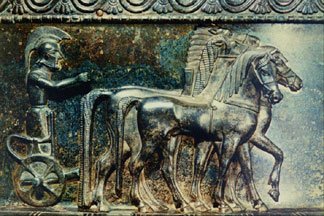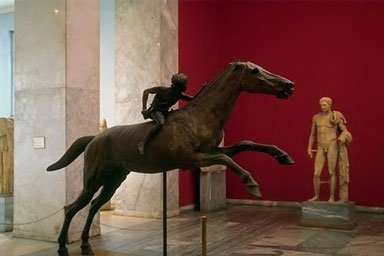The Olympics in Ancient Greece

The first Olympic Games were held in 776 B.C. They were held for five days every four years as a part of a religious festival to Zeus, the king of the gods. A two-month truce was called throughout Greece to insure the safety of those traveling to and from the events. Conflicts and wars between city-states were halted during this time. The five most common events at the Olympics were wrestling, running, long jump, discus, and javelin. Another event was an all-out fighting match called the pankration. In this event, almost everything was legal except biting or eye gauging.
 Chariot racing was another favorite event at the games. Two-or-four horse teams pulled the chariots. Chariots raced twelve laps around posts at either end of a circular course. Often thirty or more chariots raced making for a crowded field where collisions were common. In some races, only a few competitors completed the race because of the numerous collisions.
Chariot racing was another favorite event at the games. Two-or-four horse teams pulled the chariots. Chariots raced twelve laps around posts at either end of a circular course. Often thirty or more chariots raced making for a crowded field where collisions were common. In some races, only a few competitors completed the race because of the numerous collisions.
Winners of the competitions were awarded a laurel wreath from a sacred tree dedicated to Zeus. Winning athletes were treated like stars by fellow citizens from their home cities. Some city-states began to pay the winners of events to encourage athletes to train and compete. Some cities gave meals for life to the winners. Victories brought honor to a city.
The Olympics Games were for males only. Once, a mother attended the games disguised as a trainer. She became so excited after her son’s victory that her true identity was revealed. After that, the trainers had to attend the games naked. This was to prevent anymore women from disguising themselves as men. The rule was already in force for the athletes.
Females often attended the Heraea, an event held in another area of Olympia at the same time as the Olympics. The Heraea was in honor of Hera, the queen of the gods. The events featured a foot race of about 500 yards. Spartan women had a greater advantage because of their city’s emphasis on athletic training for both men and women.

Life Around Town in Ancient Greece
Agora Architecture Greek City States Climate and Geography Law Enforcement
Money Olympics Traveling Town to Town

